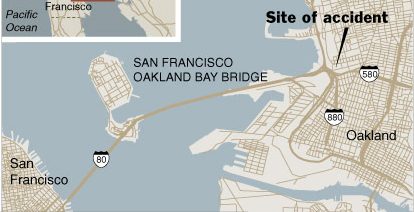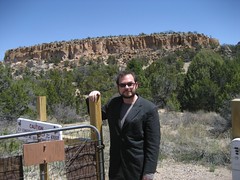So a former student invited me to give a talk on Plato at the Junior College where he now teaches: The Republic, in an hour and a half. So I’m busy condensing my notes and I’ve got this chunk about craft analogies: ship’s pilots and farmers and shoemakers and all that Platonic palaver. Bah. Shoemaking. Not relevant to today’s modern world (I don’t really know what I was thinking.) Then I went out to catch a cab to go give my talk and – I kid you not – the bottom of my shoe fell off. Well, not quite all the way off. But, like, halfway off.
We had an interesting discussion the other day after Harry’s “post”:https://crookedtimber.org/2007/04/25/roots/ about Show of Hands and their song “Roots”. That argument was partly about the possible recuperation of song by the radical right despite the inclusivist politics of the songwriter. Yesterday’s Guardian had “an interesting piece”:http://music.guardian.co.uk/folk/story/0,,2071468,00.html attacking the the politics at the origin of folksong as a distinct genre, and especially the politics of the folksong collectors Sharpe and Lomax. Hugh Barker and Yuval Taylor argue that the search for authenticity and the untainted roots of distinct national tradition as embodied in besmocked peasants (and so on) is imbued with ghastly racist assumptions of various kinds and that we should simply reject the idea of a distinction between folk and popular song.
{ 49 comments }
The NYT has an article about Bruce Sperling, who apparently publishes a series of rankings of U.S. cities, with separate rankings for Singles, Young Couples, Families with Children, Empty Nesters and Retirees. Through the magic of weighted averages (of data on economy and jobs; cost of living; climate; crime; transportation; arts and culture; etc) we get a string of Top-10 lists and more. Like many such ranking systems, Sperling is free to put his thumb on the scales if he feels that people are caring more about variable _x_ these days.
In the Top 10 for Singles are the fun, densely-populated places you might expect: New York, L.A., Washington, San Francisco, Chicago, etc. For Young Couples, we have cool hangouts like Portland, Austin, and Boulder. Empty Nesters get to kick back in Bellingham, Santa Fe, Tahoe and Berkeley.

But what does my demographic, Families with Children, get? Number 1 in the nation: Louisville CO. It’s followed closely by Gaithersburg MD. Roswell GA, Lakeville MN, and Flower Mound TX round out the top five. Now, I don’t want to offend the many fine people of Gaithersburg, MD or Noblesville IN, but Roll on the Empty Nest, I say.
_Update:_ Sorry, but I am going to resist sundry efforts in the comments and elsewhere to stretch this small joke to fit the Procrustean bed of “Elitist Liberals Hate Regular Folks and All-American Suburbs.” Dan Drezner thinks I display “shock” and “distress” at these family-friendly places and that part of me “shudders with dread about the exemplary suburban locale.” I don’t think so. New York … San Francisco … Gaithersburg. That is a set-up and punchline. It could be the opening montage of any number of comedies about family life. By the way, child-free urban hipsters in restaurants or shops can bite me, too.
{ 37 comments }
This month’s issue of _Contemporary Sociology_ contains the following erratum notice:
bq. In the January issue … in the review written by Elizabeth Gorman of _The Work and Family Handbook: Multi-Disciplinary Perspectives and Approaches_, edited by Marcie Pitt-Catsouphes, Ellen Ernst Kossek, and Stephen Sweet, the contributors’ last names should have been spelled “Karen Gareis” instead of “Karen Agrees,” “Laura Beavais” instead of “Laura Beavers,” and “Gerstel and Sarkisian,” not “Gretel and Sardinian.” We regret the errors.
{ 20 comments }
Several days late and dollars short, my response to Jonathan Chait’s “essay”:http://www.tnr.com/doc.mhtml?pt=xQrNb9zsY1hUSr5ditd9qS%3D%3D on the Netroots. It’s taken me a while to write something, because his underlying thesis is expressed a little circuitously, and I’ve wanted to be sure that I understood exactly what he was saying. Short version – there’s a serious argument in there. But it’s wrong, or at the least badly exaggerated. [click to continue…]
{ 45 comments }
I teach my last class of the semester tomorrow, and what a semester it’s been. In the four months since I gave up full-time, long-form solo blogging, I have put my extra time to good use: freed from the demands of daily blog posting and comment-section maintenance, I found time to work out every day for 90 minutes, meditate for an hour, cook dinner nightly, and brush up on my French. As a result, I am fit and sane and centered, enjoying a balanced diet and the consolations of the <i>passé simple</i>.
Actually, that’s not true. And Bourdieu didn’t really appear in <i>Slap Shot</i>, either. This semester, neither did I: my Nittany Hockey League teams had 28 games scheduled this semester. I made it to <i>ten</i> of those. I worked out once, maybe twice a week. I last meditated in 1999. I last cooked in 1994. (Janet and I have taken to asking each other, “whom shall we dial tonight?”) And my French is just as abysmal as it ever was.
So what happened to all that time?
{ 45 comments }
I have been meaning to write an update to my post of last month. When I skimmed the first accounts of the captured British sailors’ time in Iran I was under the impression they had been subjected to full-on mock execution, of the Dostoyevsky type. That is, told they were going to be executed, lined up and blindfolded, etc. Reading more I learned that it was more of a confused situation (still very alarming, no doubt), in which they were blindfolded and cuffed and could hear weapons being cocked. So, not actually torture (and some people pointed this out in the thread at the time.) It was scary as hell, no doubt, and I hope I’m never in that situation, or at least that, if I am, John Derbyshire is there to rush the armed soldiers and bite their throats out. I’m still ready to go nuclear, though, and I actually learned a lot reading that not-flamewar comments thread.
On the other hand, I thought that the comments to Kieran’s post on Megan’s difficult situation were unusually useless for the most part. This from John Quiggin was good, though:
[click to continue…]
{ 34 comments }
Like a few other CTers, I’m swamped with end of semester duties at the moment, but wanted to point to this “very useful FT article”:http://www.ft.com/cms/s/8f938380-f781-11db-86b0-000b5df10621.html on the background to the Turkey crisis, and make a few short arguments in lieu of a proper post. As Brad DeLong often says, the FT is the best newspaper in the world (albeit not entirely without flaws); certainly, I haven’t seen any detailed English language analysis anywhere of the lead-up that competes with this piece.
the story of the past few weeks is a tale of misunderstandings, sexism, snobbery, bruised egos and mutinous soldiers, from which nobody emerges with much credit. … Mr Erdogan seemed to be racked with indecision over whether to run for the presidency himself … But he knew that his would be a divisive candidacy … he and his closest advisers settled on two possible candidates from his party who would be acceptable to the army. … Getting the generals on side had proved unexpectedly easy. … The man he had to convince most of all was Bulent Arinc, the speaker of parliament. … Mr Arinc also wanted to be president. But his candidacy would have been even more divisive than Mr Erdogan’s. … After much deliberation, the three agreed that the candidate would have to be Mr Gul. …at general staff headquarters, … there was a sense of shock. What had happened to the two agreed candidates?
The immediate roots of the crisis are in internal divisions in Turkish society and personality politics. But it’s interesting how outside actors have influenced these domestic battles over the last several years, and have responded to what’s happened in the last few days. The European Union, over the longer term, has exacerbated internal tensions in Turkey badly over the last few years, or in the very kindest interpretation has done nothing to help relieve them. The prospect of EU membership helped stabilize relations between Islamists and the army, promising Islamists a greater degree of religious freedom and human rights, while reassuring the army that Turkey wouldn’t become an Iran-lite style Islamist republic. The underlying tensions that have now exploded can be traced back in part to the ever more explicit reluctance of powerful EU member states to countenance Turkey joining, even in the long run. Even so, during the current impasse, the EU’s enlargement commissioner, Olli Rehn has played a positive role by making it clear that a military coup, or anything like it, will stymie Turkey’s chances of membership more or less indefinitely. He’s also publicly warned member state governments that are skeptical of Turkish membership of the EU not to play politics. In contrast, the US, which should be held much less to blame over the longer term, has hinted that it isn’t entirely averse to the generals’ actions, saying that it considers the battle taking place to be an internal matter.
The current events in Turkey highlight starkly the contradictions in US policy. While the US has publicly committed to the spread of democracy etc, it hasn’t wanted to acknowledge that this spread is liable to go along with Islamists of one sort or another coming to power in regimes in the Middle East and elsewhere. Even the relatively mild variety of political Islam in Turkey (which seems likely, under the right conditions, to turn into a Muslim version of Christian Democracy) seems to make US policy makers break out in hives. If the US doesn’t take a more forthright stance on the implicit threat of the Turkish generals to overthrow the regime if they don’t get their way, it says rather a lot about their actual, as opposed to their nominal, commitment to the spread of democracy (but then, its mostly supine “attitude”:http://abuaardvark.typepad.com/abuaardvark/2007/03/results.html to the Egyptian ‘constitutional referendum’ in March has said quite a lot about that already).
{ 21 comments }
Just a note to welcome my former colleague Andrew Levine to the blogosphere, in a blog named “Democrats Now“. His first post explores and explains why it will be so hard to defeat Clintonism within the Democratic Party, and his second delineates some of the mysteries of modern American politics (like, how on earth did the Republicans become Reds?), and makes a reasonable case that Monica Lewinsky saved social security. Andy’s a prolific and clever writer with a quirky sense of humour, and his blog will join the tiny handful that I read daily.
{ 47 comments }
Mission accomplished or not, it’s time after four years to call a halt. Only after the governments of the Coalition countries admit that military power has failed, and that nothing good will be achieved by persevering can we make a serious assessment of what can be salvaged from this disaster.
The most important thing that can be done now is to help the millions of refugees who have fled the awful combination of invasion, insurgency and civil war the Coalition governments have unleashed upon them (noted blogger Riverbend just announced that she and her family would be joining the exodus, long after Allawi, Pachachi and others held out in the past as hopes of the nation). But clearly nothing will be done as long as policy is ruled by the delusion that victory is just a surge away.
There are plenty of other obstacles. Many of the refugees are in Syria, and any suggestion of co-operation with Syria is anathema. Even more importantly, any serious proposal to do something about refugees would involve a massive increase in the intake by members of the coalition countries, and (as I’ve found from previous discussions on my blog) the chickenhawks who pushed this war are utterly terrified by the risks this would involve, given that many of these refugees have little reason to love us. Even suggestions that we are obligated to rescue those who risked their own lives working for the Coalition are much too scary for these fighting keyboardists.
{ 142 comments }
Its difficult for a republican to watch The Queen, and for several reasons. First, its not very good — Helen Mirren is fine, of course, but none of the set pieces rings true, Cherie is overacted and implausible, anyone who has watched enough Rory Bremner could have written the Campbell/Blair dialogue, and, although the actor playing Blair captures his mannerisms, he does so too obviously (why didn’t they just cast Bremner, I wonder?). Second, just as at the time 10 years ago, one’s loyalties are torn. Of course, in some sense one wants the monarchy abolished. But, while one finds the Queen utterly despicable in most respects, her reaction to the collective insanity of a large part of her nation does her credit. The indecent and frankly lunatic mourning of millions for someone they didn’t know and who was, basically, a manipulative wastrel, bemused at the time. My feeling was something like: “Well, if this is what sinks the monarchy, what’s the point? Let’s just keep the sods”. Finally, and crucially, you just cannot suspend your knowledge that, in the end, the Queen wins, with Blair’s help. There’s just no dramatic tension for anyone over the age of 18 who is not senile.
Which brings me to the question which started bugging me about half way through the film: why isn’t there a film of Five Days in London, May 1940 (UK
)? Author John Lukacs tells the story of the first 5 days of Churchill’s premiership, the period during which the war was not won, but, more importantly, was not lost. The focus is on the struggle between Churchill on the one hand, and the defeatists Chamberlain and Halifax (Halifax having, apparently, been the King’s preference for Chamberain’s successor), with Clement Attlee and Arthur Greenwood, having joined the War Cabinet when Labour became part of the coalition government, starting out as observers but then getting drawn in to the battle. You see Attlee starting to realise that he had play the self-abnegating role as Churchill’s ballast that he maintained throughout the war. (A possibly apocryphal moment, which the ungossipy Lukacs does not treat us to, has Attlee pointing out to Greenwood that if Churchill loses to the Tory grandees civilisation in Europe will be gone, Greenwood retorting that if so, “it won’t be our fault” and Attlee responding “I don’t want to go down in history as someone whose fault it wasn’t when civilisation was destroyed”). Lukacs takes the struggle a day at a time, interweaving the high-level political struggle with documentary accounts of the mood of the country. The characters are larger than life; there is no collective insanity; and the stakes are high. Best of all, when you’re reading it, you keep forgetting what the outcome is going to be. It’s a thriller — perfect material for a movie, and a much better one than The Queen.
I hope it’s not a spoiler to reveal that Churchill’s faction won, and civilisation was saved to live another day. What a relief!
{ 71 comments }

Ouch.
(04-29) 11:49 PDT OAKLAND — A huge ball of fire from an exploding gasoline tanker truck caused an overpass in the MacArthur Maze in the East Bay near the Bay Bridge to collapse on top of the highway below early Sunday, virtually ensuring major traffic problems and confusion for weeks to come. The intense heat crumbled the elevated roadway that carried eastbound traffic from the Bay Bridge onto Interstates 580 and 980 and state Highway 24. The broken concrete fell like a blanket over the connector roadway from southbound Interstate 80 to I-880.
Good luck with that commute tomorrow.
{ 25 comments }
(Those who don’t know about Bristol’s most famous “artist” can google for “Banksy” or check the Wikipedia.)
.
{ 22 comments }
New Yorker Matt Yglesias’s westward march, from Washington DC to Santa Fe and maybe beyond, has been attracting some attention. So far the highlight has been what you might call the Fashion Trail of Tears, pictured here. An iconic image, I think. Today he freely admits to never having heard of Kit Carson (knowledge of whom had even made it to the Ireland of my youth) and notices how sunny it is in New Mexico.
Maybe Matt will continue west and get to Tucson and see the saguaros. (“Some kind of spiny tree.”) Of course, I’m a relatively recent transplant to the Southwest myself. One thing I didn’t want to have happen when I moved out here was to succumb to a common disease of grad students recently relocated to new jobs, which is to chronically pretend you are still living on the campus where you got your degree, or — worse — in the downtown NY apartment or beachfront West Coast condo you daily fantasized about living while writing your dissertation. So I bought a mountain bike and started exploring.
Although it takes a long time to really get to know a place, it’s surprising how quickly you can adapt to some things. For example, I can now wear jeans in the kind of summer temperatures that, when I first moved here, I didn’t think were capable of sustaining human or other animal life.
{ 47 comments }

